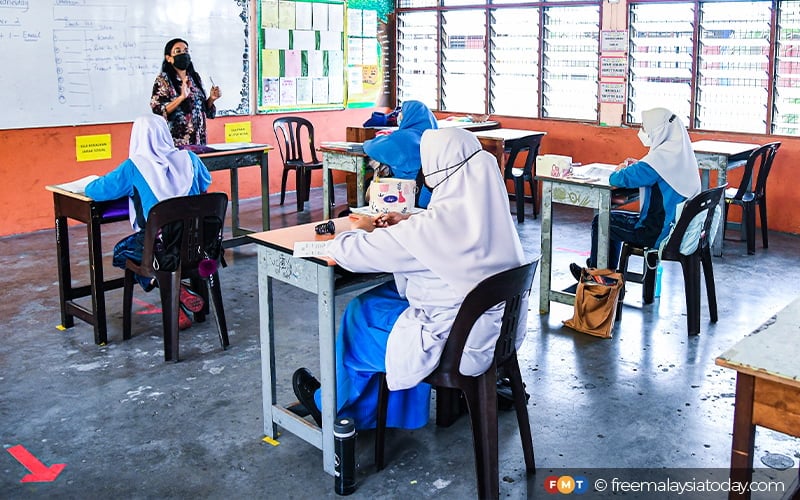
From Praba Koran
Education plays a vital role in the future of a nation. Countries which have a quality education system which cater to the trends of the future tend to stand out.
Singapore, Finland and South Korea are a few countries which excel because their education system is free from political and other considerations.
A good question to pose for Malaysia is: what has the country achieved in terms of primary and secondary education in the last few decades?
Over the last few decades, the education system of the country has continued to evolve, with each new education minister bringing a new method that he hoped would change the quality of education for the better.
However, considering the last few years of the Programme for International Student Assessment (PISA) results, the fact that stands out is that Malaysia has not improved much and we are in the “average” category.
Malaysia in the 1960s had a world-class education system but it stopped being so after various education ministers decided to tweak the system to boost their political credentials.
When the English language was relegated to a subsidiary subject, the downfall began. When there was a perception that national schools were evolving to become Islam-centric, non-Malays flocked to vernacular schools.
More international schools have sprouted up as people have lost confidence in national schools. However, only the upper-class and middle-class segments of society can afford to send their children to such schools.
Over the last few years, vernacular schools are seeing an increase in Malay student enrolments.
Confidence in the national schools is at an all-time low, yet the authorities are unable to accept this fact or prefer to avoid tackling the issue for fear of upsetting the voters who have been conditioned to live with the present dismal education system.
There is a need for a government that is willing to take bold measures to reverse the downward spiralling of the education system. Perhaps the time has come to bring back English-medium schools with an emphasis on Bahasa Malaysia in the curriculum.
In the 1960s, even children from the kampungs and estates were able to cope with English being the medium of education. So, this cannot be an excuse to not implement this system.
We must accept the fact that Malaysians who are fluent only in the national language will not go far. However, those who master the English language will have a decisive advantage.
Just look at the employment market today. My view may not sit well with perhaps a majority of the populace but sometimes tough steps must be taken to ensure that the future generation of Malaysians will be globally competitive.
Another point to note is that education used to be based on books and lectures. Now, it is iPads, smartphones and laptops. This is more so especially after the Covid-19 pandemic.
In the past, students would have to spend hours in libraries poring over books for a project or research. With the huge advantages of having the internet at our fingertips, we can change those hours into mere seconds.
One major difference that has changed through the curriculum in schools is teaching students skills instead of content.
With the advent of Artificial Intelligence (AI), students can rely on AI to do all their work. This may be a problem in the future if this reliance results in students not using their acumen to be creative or innovative.
Today, if you walk into a high-functioning classroom, you will see kids in groups. The working world wants people that can work together. This is the norm in successful countries.
Students who are exposed to more languages and soft skills will tend to be more successful in the real world than students who memorise and regurgitate facts from textbooks.
Malaysia needs to change from the rote learning methodology. Our students have been “dumbed down” over the years.
In the past, students were seated and told to memorise the information based on textbooks. Nowadays, that curriculum has expanded and it is making students work in groups to compare, contrast and discuss various topics to increase their knowledge and work on their communication skills.
This will be more helpful rather than just memorising facts. The main reason for the curriculum change is the changing world around us. With the many changes in society, the curriculum must adjust to change to be with the times.
Another major change within the past 20 years was the way students “soaked up” knowledge. Twenty years ago, the teacher would lecture for an hour. This has now changed into interactive apps and informational websites for students to use.
Students today prefer using websites because it is always more fun than sitting at a desk for a whole period and listening to the teacher ramble on about facts found in textbooks.
Along with students, the teachers need to be retaught on what and how to teach. Teachers are required to go to professional development meetings to learn how to adjust their classroom to fit into the frequently adjusted curriculum.
Virtual learning is the way forward. Students need to be exposed to IR 4.0 and Industry 5.0. Subjects need to be customised to be on par with the changing technology relevant to the job-seeking populace.
With the many changes in the world around us, our education curriculum seriously needs to be adjusted.
A drastic revamp of the education system is needed, but do we have the political will to do so? - FMT
Dr Praba Koran is the deputy CEO of the ‘Asian Centre for Leadership & Civilisation’ and is an FMT reader.
The views expressed are those of the writer and do not necessarily reflect those of MMKtT.



No comments:
Post a Comment
Note: Only a member of this blog may post a comment.